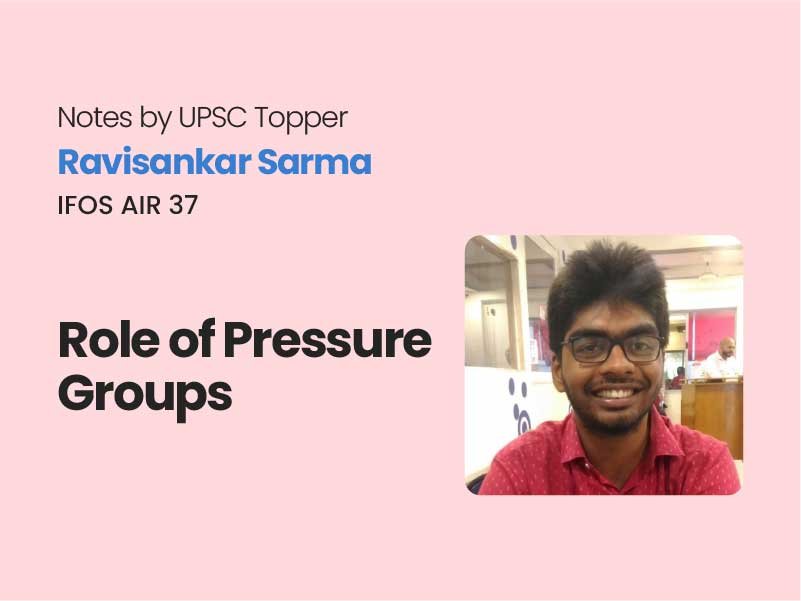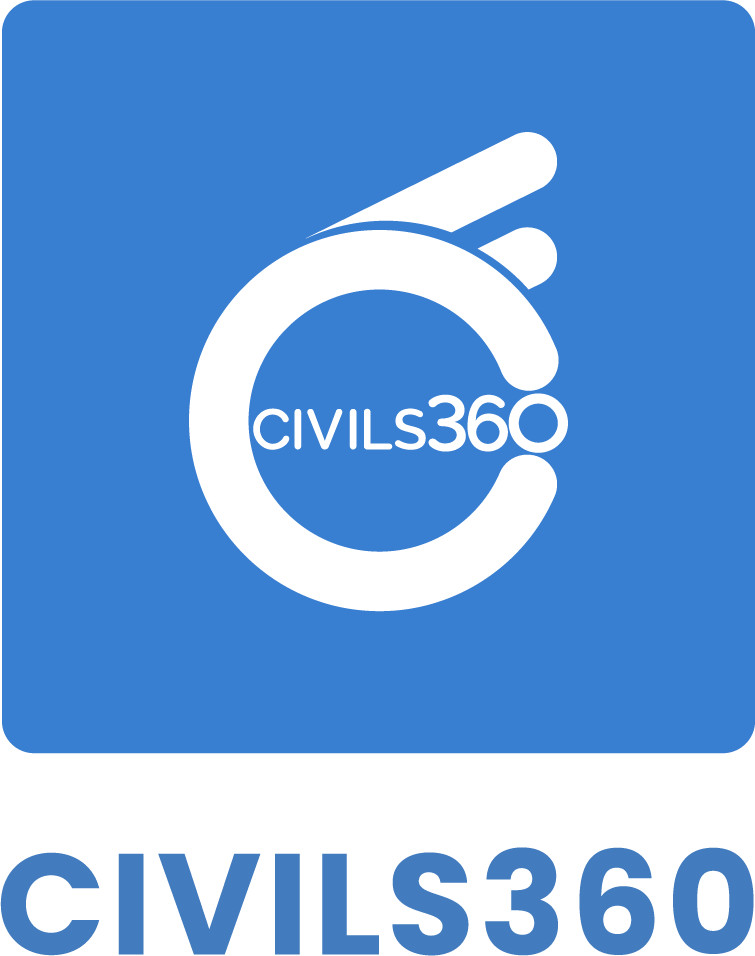
Role of Pressure Groups
What is Pressure Groups?
A pressure group refers to a group of people that come together to influence and change government policies in a manner that is concurrent and suitable to their interest. They hold no aspirations for gaining political power and hence does not directly take part in elections.
Positive Role of Pressure Groups in Democracy
Check on Government Actions: Pressure groups shores up the accountability of the government and serve as a vital check on government actions and inaction. It helps in cultivating a responsive and pro-active government.
Eg: MKSS – RTI
Citizen Participation: Pressure groups provide a platform for citizens with common aspirations and opinions to engage with the state. Hence they enhance political consciousness of average citizens transforming the country into a participative democracy rather than merely an elective democracy.
A bridge between Government and Public: Pressure groups of different sections in society help articulate their aspirations and interests to the government which allows the government to take better governance, legislative and administrative decisions.
Eg: Bharatiya Muslim Mahila Andolan – Criminalization of Triple Talaq bill
They raise awareness among the general public regarding government policies and schemes, their utility, benefits and coverage.
Eg: Shuddhi(NGO)’s support and assistance in implementation Swachh Bharat Abhiyan
Negative Role of Pressure Groups
Promotion of Sectional interest: The influence exerted by pressure groups is reflective of sectional interest rather than in consonance with the larger public interest.
Eg: SNDP is an organization that works for the betterment of the Ezhava community in Kerala alone
Divisive tendencies: Pressure groups promote interests of multiple sections which may be conflicting in nature. This has a tendency to lead to polarisation which affects the unity of our country
Read Also Mukurthi National Park
Eg: Ghar wapsi movement of Vishwa Hindu Parishad to facilitate re-conversion of non-hindus to hindus has soured relations between Hindu and Muslim communities
Anti-Development: Pressure groups may exert unwanted and ill-conceived pressure to scuttle developmental projects of government. They may mobilize public opposition to achieve the same.
Eg: Recent protest in Kudankulam nuclear power plant
Asymmetrical Benefit: Greater possession of economic and political resources with small number of pressure groups help them to corner benefits accorded by government policies and decisions.
Eg: Large scale businesses and entrepreneurs are likely to benefit better from the newly implemented goods and services tax system as compared to MSMEs. The greater influence of pressure groups such as FICCI and CII may have played a part in the same.
Formal Pressure Groups
These are pressure groups formally organized and registered bodies having their constitution, finances etc. The government are aware of their presence and consider the opinions articulated by them before framing legislations, policies and schemes of which they are potential stakeholders.
Eg: FICCI, CII, IMA
Informal Pressure Groups
These are groups that are formed on the basis of a commonality of identities, they are informally organized and are not registered with the government. These pressure groups are largely based on religion, caste, ethnicity and language etc.
Eg: Bharatiya Muslim Mahila Andolan – Pressure group that works for equality for Muslim women in India
- How do pressure groups participate in the Indian political process? Do you agree with the view that informal pressure groups have emerged as more powerful than formal pressure groups in recent years?
How Pressure groups influence public policy?
- Electioneering: Placing in public officer persons who favour their interests better
- Lobbying: Persuading public officers to adopt and enforce policies of their interest
- Propagandizing: Mobilizing public support for their cause by making appropriate use of media or other political methods of marches, strikes, protests
Role of NGOs
- Citizen Participation: NGOs provide a platform for ordinary citizens to be effective participants in a democratic society by raising a collective voice. Hence civil society organisations are vital to India being not merely an elective democracy but a participative one, where voters are able to engage and question its representatives.
- Check mechanism: Keeps a check on the government’s activities and ensures it remains accountable, answerable, responsive and pro-active.
- Mazdoor Kisan Shakti Sankethan’s pressure on government to bring about RTI act
- Socio-Economic Emancipation: Assists the state in implementation of its welfare schemes and projects in various fields including poverty, hunger, environment, women empowerment etc.
- Mid-day meal scheme: ‘Akshayapatra’ NGO assisting in the implementation
Need for State Regulation of NGOs
- Inappropriate usage of funds: Donations appropriated have not been put to judicious and productive usage. Large proportion of funds have been diverted for institutional and salary needs whereas actual contribution to socio-economic emancipation has been below par
- NGOs asked to file income tax returns without overdue to regulate spending. They cannot spend more than 50% on administration
- Channel for Money laundering: NGOs have been used as a garb to launder money for terrorist, extremist and religious conversion activities.
- Foreign Contribution Regulation Act imposed legal restrictions on foreign donations to NGOs. Many terrorist and extremist agencies have been using such money channels for money laundering for anti-national activities
- NGOs need to submit an annual report on financial contributions and donors
- Anti-Developmental Activities: NGOs have also been found to mobilise public opposition and hatred towards government development projects without genuine reasons that have caused substantial economic losses to the country.
- Kudankulam Nuclear power project faced huge protests that received financial support from U.S based NGOs
Formal associations
Political Party
A political party refers to a group of people who come together driven by a common political ideology with an objective of attaining political power. They aspire to directly take part in elections and gain control of administration and governance in the country.
Role of Political Parties
- Political Consciousness: Political parties provide an avenue for citizen to be recruited into political activities and provide political orientation to them
- Mobilize the electorate: At the time of elections, parties activate, promote and propagate their ideology of governance and administration among the electorate
- Interest Articulation: Political parties may be built on the very foundation of representing interest of certain sections of society which they campaign for and initiate a healthy debate in the public domain.
- Bahujan Samajwadi party founded mainly to represent the interest of Dalit section of society in U.P
- Mediator between Groups: Political parties aim to bring about harmony between various groups in society by resolving differences between them and aiming to be accommodative and inclusive in their actions and ideology
- Social Welfare: Political parties perform social welfare functions like alleviation of sufferings during famine, drought, assistance during disaster management etc.
- The functioning of Democracy: The presence of multiple parties and contrasting ideologies ensure that diverse opinions and interests are represented. It also ensures accountability and responsiveness of incumbent governments in Union and states.
Read Also Urban Naxalism
Demerits of Parties
- Polarization: Political parties have at times contributed to polarization of society on ethnic, linguistic and cultural lines. There have been instances of hate speeches causing communal rifts which may have adverse impacts on unity of a society as culturally and religiously diverse as India
- Gorkha Jan Mukti Morcha – Promoting demand of Gorkhaland due to imposition of Bengali on Nepali speaking Gorkha community
- Lack of internal Democracy: Democracy within political parties in India have waned in the recent past with handful leaders at the helm augmenting all the decision making and policymaking powers
- Selfish Interest: Rather than serving interests of the public, political parties have become a tool for self-emancipation. Members of parties often abuse their position for their own socio-economic and political gains
- Nexus with Corporates: Political parties depend on corporates for funding and this paves the way for the formation of a nexus between these entities with the interest of the general public compensated as a result
- Criminalization of Politics: Indian political system has witnessed the presence of several convicted politicians who participate and win in elections.
- Destroys individuality: Political parties exert great control over its members which does not allow an individual to shape or articulate his own opinion forcing her to be in conformity with opinion of the party.
Criticisms of CSR
- Regional Disparity: High earning companies are highly concentrated near industrial parks in cities in productive states. Hence there is a regional disparity in social sector emancipation that is carried out through CSR.
- Confined to Locality: Most companies engage in activities to promote education, health and environment near their own institutions. However, there is little concern to develop scalable models of CSR that can be extended to the whole country
- Righting their Own Wrongs: Certain companies which have been responsible for social and environmental repercussions have been engaged in CSR activities to compromise for the same. For example, mining companies given their sinning effect on the environment have been big spenders to clean environment
- Attention to Expenditure: Although companies oblige to the prescribed proportion of expenditure, productivity in its shadow has gone amiss
- Sectoral Disparity: Most companies have adopted the same sectors mostly education or health in their CSR activities while other sectors including environment, skill development lie ignored
Enroll today with the best civils service academy and take your first step towards your Civils journey. Feel free to reach out to us for any inquiries, collaborations, or support. We’re here to help.

